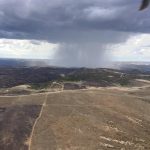Hospital leaders voice concerns of service cuts due to ‘Big Beautiful Bill’
Hickenlooper calls legislation 'Big Beautiful Betrayal'

Courtesy photo
U.S. Sen. John Hickenlooper convened a roundtable of Western slope health care and civic leaders on Wednesday, Aug. 20 at Memorial Regional Health in Craig to discuss the possible impacts of U.S. House Bill HR1 on rural healthcare., commonly referred to as the “Big Beautiful Bill“, which was signed into law on July 4.
The primary concern of the health care executives in attendance was the potential loss of Medicaid funding which Western slope hospitals and clinics rely on for their operations.
Jennifer Riley, chief executive officer of Memorial Regional Health in Craig, said, “Colorado is already facing a pretty tremendous challenge with health care….we know 70% of hospitals in Colorado are operating with a negative or unsustainable operating margin…and Medicaid continues to fall short in terms of covering the cost of care. When resources run out, we know hospitals are going to be forced to close services and potentially close in their communities.”
Hickenlooper emphasized that the solution to the problems facing rural health care as a result of HR1 will need to be bipartisan.
“This is a problem. It’s everybody’s problem and we have to get everybody at the table to fix it.” Hickenlooper said, adding that “….that bill was horrendous…it should be called the ‘Big Beautiful Betrayal’ because it does the opposite of what people have promised,” said Hickenlooper.
Riley said Colorado is expected to lose nearly 150,000 covered individuals with the passage of HR1 and will be facing a $10.7 billion shortfall in federal funding with the reduction of the hospital provider tax.
Riley also cited the importance of hospitals in rural areas and the ripple effects that HR1 may have on the communities they serve.
“We hospitals are generally the largest employer and we generate a tremendous amount of economic impact in our communities. Memorial Regional Health has 375 employees with 80% living and working in Moffat County. That’s about $62 million of economic impact in a year. Any time we make a change to our workforce, that directly impacts what happens in Craig,” she said.
Stephanie Einfeld, chief executive officer of Northwest Colorado Health, stressed the potential loss of home health and hospice services as a result of HR1.
“We are basically the safety net for so many people in home health and hospice. The majority of our patients have Medicare and Medicaid.” said Einfeld. “The people that we serve are the ones who made this valley what it is. They are the ones who have lived here for years and years. They’ve worked in the mining industry. They’ve worked at the hospitals and they’ve been teachers. And now they need help staying their homes and that’s what we do. But the model is not sustainable.”
Hickenlooper said “most individuals in the House recognize the writing on the wall and that their citizens do not like this bill.” The senator reiterated his belief that a bill will come together in a way that finds a solution to the funding crisis created by HR1.
“We have to have more Medicaid, not less,” said Hickenlooper.
Sen. Hickelooper concluded the roundtable discussion by encouraging people to talk to leaders on both sides of the political aisle to seek resolution and compromise.
“We just have to do a better job of showing the other side that it’s not full of freeloaders,” he said.

Support Local Journalism

Support Local Journalism
Readers around Craig and Moffat County make the Craig Press’ work possible. Your financial contribution supports our efforts to deliver quality, locally relevant journalism.
Now more than ever, your support is critical to help us keep our community informed about the evolving coronavirus pandemic and the impact it is having locally. Every contribution, however large or small, will make a difference.
Each donation will be used exclusively for the development and creation of increased news coverage.




